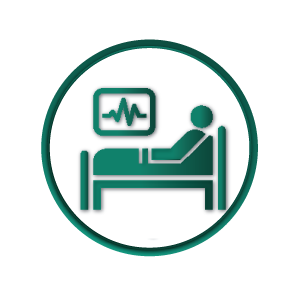Departments
CRITICAL CARE
The Critical Care Unit at Tenderpalm Hopital is a world-class facility that aims to provide excellence in emergency critical care medicine.
Tenderpalm Hospital’s critical care unit offers advanced and compassionate health care to critically ill patients with a professional approach. We have 20 beds in our critical care unit with advanced features like central monitoring and isolation bed. It has back-up centralized monitoring. Our performance in patient care is comparable to international standards in terms of survival, nosocomial infections, and patient satisfaction. Our state-of-the-art Multidisciplinary Intensive Care Units is providing maximum patient comfort and privacy.
We have the latest multipara monitors for invasive and non-invasive monitoring with a central monitor. All the beds are fully equipped with latest monitors, ventilator support, syringe pumps for minute monitoring of the small quantity of drugs, etc.
These ICUs are capable of treating patients with complex medical problems like septicemia, multi-organ failure (renal failure, respiratory failure, cardiac failure, etc.), various types of poisoning, high-risk/complicated surgical patients, road traffic accidents, post renal and liver transplant patients, stroke, advanced neurocritical care, highly equipped cardiac critical care unit, diabetic complications, etc.
We believe in delivering care that can make a positive difference in our patients’ lives. Therefore, we follow stringent protocols to provide the desired patient outcome under constant peer review. We have a high number of interdepartmental consultations for optimal patient management.
We also have an on-going ICU audit system with analysis of predicted and actual outcome analysis using severity of illness scoring systems (APACHE II and SAPS II), monitoring of protocol adherence in ICU procedures, hygiene, infection control, etc. There are on-going internal training programs for the medical and nursing staff.
The centre is staffed by a team of specialists qualified in critical care management, available round-the-clock. They are supported by an efficient team of trained nurses and paramedical staff. The centre has an ideal patient-nurse ratio of 1:1. Emphasis is placed on intensive training of the support teams in emergency and standard care for patients. The hospital conforms to the international gold standards in every aspect of healthcare.
Life threatening conditions we are treating successfully at Tender Palm Hopital, Lucknow
- Respiratory Failure: It occurs when there is an insufficient exchange of gas (oxygen and carbon dioxide) in the respiratory system. It may be caused due to COPD, Asthma, Pneumonia, etc. Depending on the type, it can cause shortness of breath or rapid breathing and loss of consciousness.
- Pneumonia: An infection in one or both lungs caused by bacteria, virus, or fungi is called pneumonia. Some of its symptoms are shortness of breath, coughing (with phlegm), chest pain, and fever.
- Acute Respiratory Distress Syndrome (ARDS): It is a type of respiratory failure that is caused due to inflammation in the lungs. Its symptoms may include shortness of breath, tiredness, rapid breathing, and low blood pressure.
- Pulmonary Embolism: It is caused when a blood clot or several small clots are present in the arteries between the heart and the lungs. Blue lips or nails, shortness of breath, back pain, cough (with blood), and chest pain are some symptoms of pulmonary embolism.
- Severe sepsis and septic shock: Sepsis or blood poisoning occurs when a bacterial infection spreads from one body part into the blood. Uncontrolled sepsis can cause septic shock that can lead to multiorgan failure. Symptoms of septic shock are rapid heart rate, low blood pressure, etc.
- Multi-organ dysfunction: There can be several degrees of organ dysfunction that occur in a continuum, rather than at once. It can be caused due to septic shock.
- Renal failure: Also known as kidney failure, it occurs when the kidneys cannot properly filter waste out from the blood. Reduced amount of urine, shortness of breath, swelling around legs, ankles and feet, nausea, etc. are some symptoms of renal failure.
- Heart attack: The flow of blood to the heart is blocked due to the build-up of fat and other substances in the arteries. Without blood, tissue loses oxygen and dies. Typical symptoms include chest pain, nausea, and shortness of breath. Many people may not experience these classic signs though.
- Heart failure: In heart failure, the heart does not pump blood as it should. Some of the symptoms are shortness of breath, swelling of ankles and feet, fatigue, chest pain, rapid or irregular heartbeat, etc.
- Stroke: Cell death occurs due to poor flow of blood to the brain. This can be due to a blocked or ruptured vessel. Symptoms include paralysis, numbness on one side of the body, trouble speaking and walking, vision problems, lack of balance, etc.
- Third-degree burns: This is a burn where the damage to the skin extends into deeper tissues and the fat layer. It can be caused due to hot liquids, fire, chemicals, or electricity. It can be accompanied with lack of pain if the nerve endings have been destroyed.
- Severe head injury: An injury to the brain, skull or scalp can lead to a severe head injury that can potentially cause brain damage. It can be caused due to accidents, a severe blow to the head, blood clotting disorders, or self-harm.
- Severe accident: Accidents that cause major injury to any part of the body are classified severe. It can lead to a head injury, fracture(s), burns, etc.
- Bone Fractures: A crack or break in the bone is known as a bone fracture. It can occur in any part of the body. Pain, swelling, bruising, skin discoloration, etc. are all symptoms of a fracture.
- Tropical diseases: These are diseases like malaria, dengue fever, and leishmaniasis ; often caused due to insect bites. Fever, rashes, swelling of lymph nodes, and body aches are general symptoms to look out for.
- Cancer Treatment
- Palliative care
- Geriatric Care
- Diabetes and Diabetes related complications.
- Poisoning
- Snake bite
- Animal bite



